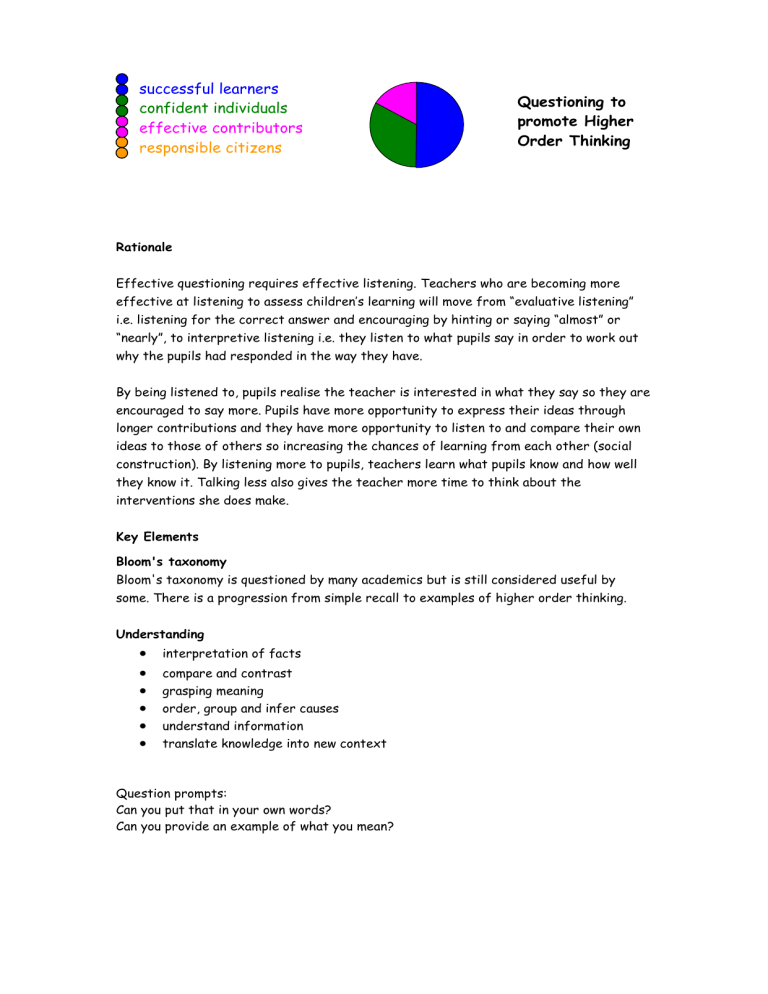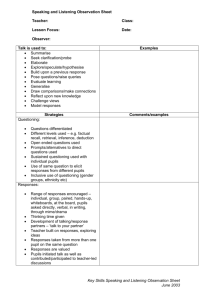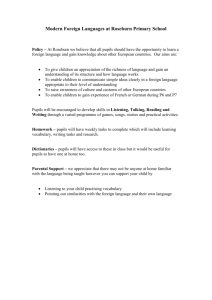
successful learners confident individuals effective contributors responsible citizens Questioning to 1 promote Higher 2 3 Order Thinking Rationale Effective questioning requires effective listening. Teachers who are becoming more effective at listening to assess children‟s learning will move from “evaluative listening” i.e. listening for the correct answer and encouraging by hinting or saying “almost” or “nearly”, to interpretive listening i.e. they listen to what pupils say in order to work out why the pupils had responded in the way they have. By being listened to, pupils realise the teacher is interested in what they say so they are encouraged to say more. Pupils have more opportunity to express their ideas through longer contributions and they have more opportunity to listen to and compare their own ideas to those of others so increasing the chances of learning from each other (social construction). By listening more to pupils, teachers learn what pupils know and how well they know it. Talking less also gives the teacher more time to think about the interventions she does make. Key Elements Bloom's taxonomy Bloom's taxonomy is questioned by many academics but is still considered useful by some. There is a progression from simple recall to examples of higher order thinking. Understanding interpretation of facts compare and contrast grasping meaning order, group and infer causes understand information translate knowledge into new context Question prompts: Can you put that in your own words? Can you provide an example of what you mean? Applying use information, methods, concepts, theories in new situations solve problems using required skills or knowledge apply, demonstrate, calculate complete, illustrate, show, solve, examine, modify, change, classify Question prompts: Do you know another instance where . .? Would this information be useful if you had to . . ? Analysing seeking patterns organization of parts recognition hidden meanings identification of components Question prompts: How was this similar to . .? If . . . . happened, what might the consequence be? Why did . . . . occur? Evaluating assess the value of theories recognise subjectivity make choices based on reasoned arguments verify the value of evidence compare and discriminate between ideas Question prompts: Is there a better solution to . . .? Why do you think . . . . . is a better answer than the previous one? What changes to . . . . . would you make/recommend? Why? Creating generalise from given facts relate knowledge from different areas predict, draw conclusions use old ideas to create new one Question prompts: What would happen if . .? Can you think of another example/situation that is similar to this and explain why it is similar? How could you devise a way to . . ? Learning and Teaching Some examples of effective questioning include: Asking children questions which probe and extend their thinking e.g. “Why do you think (recite back what child has just said)” or “Is there another way of doing that?” knowing it does not matter if there is not another way. Both answers (yes or no) involve further thought Checking out assumptions by asking why a child or group has given a particular answer before saying if they are right or wrong Asking children to explain and justify their decisions Modelling open questions that probe thinking e.g. “What do you mean by that?” or “Can you give me an example?” Giving pupils time to think about and disagree with an idea by asking closed questions e.g. “does that mean …is also true? Challenge correct as well as incorrect answers e.g. “How do you know …?” and ask other pupils to comment: “What do you think about …?” CPD that develops teachers‟ questioning skills will present models or frameworks of HOT questions, show how these are used in a teaching context and provide teachers and pupils with opportunity to generate their own questions for specific learning activities. (e.g. Reciprocal Teaching) Further Reading „How do they walk on hot sand?‟ Suffolk Learning and Management Network www.aaia.org.uk „Towards Dialogic Teaching‟ Robin Alexander „Formative Assessment in Action‟ Shirley Clarke (Hodder Murray) „Active Learning through Formative Assessment‟ „Inside the Black Box‟ series „Asking Better Questions‟ Shirley Clarke (Hodder Murray) Paul Black and Dylan Wiliam (nferNelson) Ian Smith, Learning Unlimited



